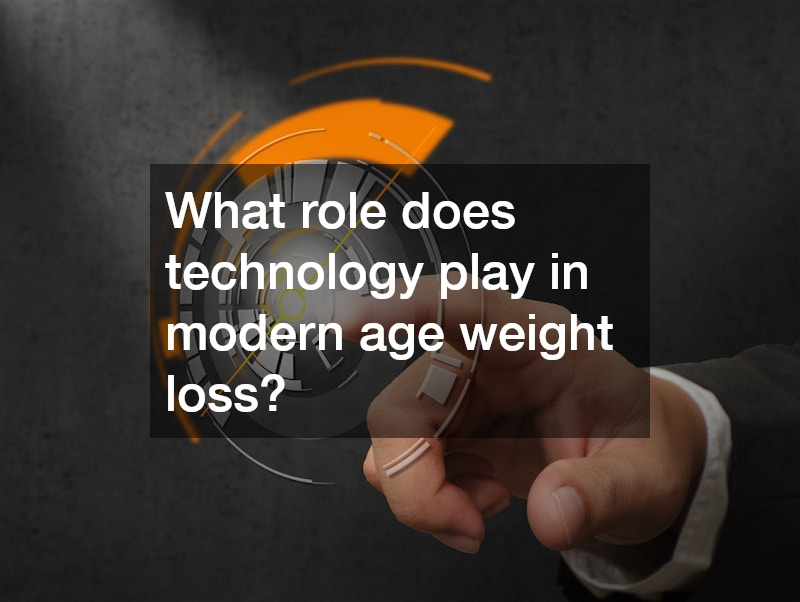

Weight loss in the modern age presents a unique mix of challenges and opportunities. With technology advancing rapidly and lifestyle habits shifting, understanding how to effectively manage weight has become more nuanced than ever. The rise of digital health tools, diverse diet philosophies, and holistic approaches has transformed the way people think about getting fit. However, alongside these innovations are persistent hurdles—sedentary routines, processed food availability, and an abundance of misinformation. This guide explores the core principles of modern weight management, offering a comprehensive look into science-backed strategies, tech-enabled support, and sustainable lifestyle changes for long-term success.
What are the key principles of modern age weight loss?

Understanding Caloric Deficit
At its core, weight loss is governed by the principle of energy balance. To lose weight, the body must expend more calories than it consumes. Creating a caloric deficit can be achieved through a combination of dietary changes and physical activity. Many people enroll in a structured weight loss program to receive tailored advice, coaching, and accountability to reach their goals efficiently and safely.
Importance of Nutrient Density
Rather than focusing solely on calorie counts, modern weight loss strategies emphasize nutrient density. This involves choosing foods that provide a high concentration of vitamins, minerals, and other essential nutrients relative to their calorie content. Leafy greens, lean proteins, whole grains, and healthy fats offer satiety and energy, reducing cravings and supporting overall health during weight loss. Nutrient-dense foods are also important for individuals who require specialized care, such as those visiting a foot doctor or podiatrist for weight-related foot issues.
Role of Hydration
Staying properly hydrated is an often overlooked yet crucial element in weight management. Water helps regulate appetite, improves digestion, and supports metabolism. Many individuals mistake thirst for hunger, leading to unnecessary snacking. Prioritizing hydration can improve workout performance, increase energy, and help maintain a healthy body weight. Clients using medical spa services for weight management may also be advised to monitor hydration closely to support skin elasticity and overall detoxification.
Incorporating Regular Exercise
Physical activity is vital not only for burning calories but also for enhancing mood, preserving muscle mass, and improving cardiovascular health. A balanced routine combining strength training, cardio, and flexibility exercises provides the best results. Signing up for a gym membership is a popular and effective way to stay committed to a fitness regimen, especially when access to personal trainers, group classes, and specialized equipment is available.
Tracking Progress and Adaptation
Tracking tools, whether digital or traditional, help maintain accountability and highlight progress. Monitoring food intake, weight changes, fitness levels, and even mood patterns allows individuals to adapt strategies as needed. Some people benefit from working with professionals such as a podiatrist or pain management specialist when progress is slowed by joint or foot pain, which can limit mobility and hinder physical activity.
How have diet trends evolved in the modern age?
The Rise of Plant-Based Diets
Plant-based diets have grown in popularity due to their health benefits and lower environmental impact. Emphasizing vegetables, legumes, fruits, nuts, and whole grains, this approach supports heart health and can aid in weight loss by naturally reducing calorie intake while increasing fiber consumption. Many weight loss program providers now include plant-based meal options for clients with dietary restrictions or ethical preferences.
Keto and Low-Carb Trends
The ketogenic diet and other low-carb variations have maintained popularity for their rapid initial weight loss effects. By drastically reducing carbohydrate intake and encouraging fat metabolism through ketosis, many find short-term success. However, sustainability varies, and long-term adherence can be challenging without proper planning. Health professionals in general dentistry may also caution that low-carb diets require careful oral hygiene, as changes in saliva and food choice can affect dental health.
Intermittent Fasting and Time-Restricted Eating
These eating patterns focus on when you eat rather than what you eat. Intermittent fasting includes cycles of eating and fasting, which may enhance metabolic flexibility and reduce overall calorie consumption. It appeals to those who prefer structure and can simplify meal planning. People exploring intermittent fasting should consult with professionals and verify that they have appropriate coverage such as medicare insurance near me, especially if preexisting conditions are involved.
The Role of Supplements
From protein powders to appetite suppressants and metabolism boosters, supplements are often marketed as weight loss aids. While some, like fiber or green tea extract, may provide mild support, they should not replace whole foods or exercise. Educated usage under professional guidance is critical to avoid adverse effects. Medical spa services sometimes include consultations about supplement use alongside detoxification or aesthetic treatments.
Digital Diet Tracking Tools
Apps like MyFitnessPal and Cronometer allow users to log meals, track macronutrients, and monitor progress. These tools provide insight into eating habits and foster awareness, helping people make more informed dietary choices. Their accessibility and integration with other devices make them indispensable for many pursuing consistent weight loss goals.
What role does technology play in modern age weight loss?

Wearable Fitness Trackers
Devices like Fitbit, Apple Watch, and Garmin watches track steps, heart rate, and even sleep quality. These metrics provide users with a comprehensive view of their health behaviors. Real-time feedback encourages movement and helps maintain motivation through gamified features and progress charts. Users with physical limitations may consult their podiatrist for appropriate footwear and activity recommendations.
Mobile Apps for Nutrition and Exercise
Beyond food logs, apps now offer personalized meal suggestions, grocery lists, and fitness programs tailored to goals. Artificial intelligence and machine learning enhance these tools, delivering increasingly accurate and adaptive recommendations. They can be particularly useful for people on a structured weight loss program looking to stay engaged outside of in-person meetings.
Online Support Communities
Virtual forums and social media groups offer camaraderie, accountability, and shared knowledge. Being part of a community helps reduce feelings of isolation and allows individuals to learn from others’ successes and setbacks. Individuals undergoing treatments from medical spa services or pain management centers often find online communities helpful for exchanging recovery tips and motivational stories.
Virtual Personal Trainers and Coaches
Remote coaching services have revolutionized fitness guidance, making professional support more accessible and flexible. Video sessions, customized plans, and regular check-ins provide a level of personalization that rivals in-person training, often at a fraction of the cost. This is especially beneficial for those who cannot regularly access a gym membership or who need support while recovering from injury.
Smart Home Gym Equipment
Technologically advanced gym gear like Peloton bikes, Mirror workout systems, and Tonal resistance machines bring interactive workouts home. These devices combine real-time feedback, personalized training plans, and streaming classes, making exercise more convenient and engaging.
Is it necessary to follow a strict diet for weight loss today?
Understanding Flexible Dieting
Also known as “If It Fits Your Macros” (IIFYM), flexible dieting allows individuals to eat varied foods as long as they meet specific macro targets. This inclusive approach helps maintain psychological well-being and can make dieting more sustainable by reducing the sense of deprivation.
Balancing Cheat Meals
Incorporating occasional indulgences can prevent binge eating and maintain a healthy relationship with food. Cheat meals serve as strategic breaks that allow individuals to satisfy cravings without derailing progress. Individuals managing chronic pain or mobility issues often benefit from dietary flexibility guided by pain management professionals or podiatric care specialists.
The 80/20 Rule
This strategy involves eating healthful foods 80% of the time and allowing 20% for enjoyment or flexibility. It supports consistency and satisfaction without enforcing rigid restrictions that can lead to burnout.
Psychological Impact of Restrictive Diets
Highly restrictive diets can trigger disordered eating, stress, and obsession over food. In the modern age, there is greater awareness of how dieting affects mental health. Promoting balance over perfection helps prevent emotional distress and improves adherence.
Customizing Your Diet Plan
Personalization is crucial, taking into account individual preferences, cultural practices, allergies, and lifestyle. Modern tools and professional input allow people to craft diet plans that fit their unique circumstances while still promoting weight loss. Those with podiatric concerns may need specific dietary adjustments to support foot health, particularly if inflammation or circulation issues are involved.
How can one maintain weight loss sustainably in the modern age?
Setting Realistic Goals
Clear, attainable objectives help maintain motivation. Instead of fixating solely on the scale, modern strategies encourage setting performance or behavior-based goals like increasing energy, improving sleep, or building strength.
Creating a Support Network
Family, friends, and online communities can provide encouragement and accountability. Whether through shared workouts or meal prep routines, involving others creates a support system that makes long-term change more manageable. Those relying on medicare insurance near me can often find wellness groups or community centers that offer peer support and education.
Identifying and Mitigating Triggers
Understanding what prompts overeating—whether it’s stress, boredom, or environmental cues—empowers individuals to manage them proactively. Techniques such as journaling, mindfulness, or cognitive behavioral strategies can be instrumental.
Importance of Self-Monitoring
Ongoing self-assessment keeps individuals aligned with their goals. Whether through journaling, periodic weigh-ins, or reflection on habits, monitoring progress helps maintain momentum and identify areas needing adjustment.
Long-Term Lifestyle Changes
Weight loss maintenance requires embedding healthy habits into daily life. This includes regular exercise, balanced eating, adequate sleep, and stress management. Sustainability comes from making changes feel routine rather than restrictive.
What are the best exercises for modern age weight loss?
High-Intensity Interval Training (HIIT)
HIIT involves short bursts of intense activity followed by recovery periods. It efficiently burns fat, builds cardiovascular endurance, and can be adapted to various fitness levels. Its time efficiency makes it ideal for busy schedules.
Strength Training and Muscle Building
Building muscle increases basal metabolic rate, helping the body burn more calories at rest. Modern programs emphasize compound lifts, resistance bands, and functional movements to enhance both strength and physique. Those with physical limitations may work closely with pain management providers or a podiatrist to tailor strength routines appropriately.
Cardio Routines for Fat Loss
Activities like running, cycling, and swimming remain foundational. Cardio supports heart health and helps create the calorie deficit necessary for fat loss. People with access to a gym membership often have more variety and consistency in cardio options.
Mind-Body Exercises like Yoga and Pilates
These low-impact disciplines improve flexibility, reduce stress, and enhance body awareness. While not traditionally associated with weight loss, they support a balanced fitness routine and help manage emotional triggers.
Innovative Group Workouts
Modern boutique studios offer everything from dance cardio to boot camp-style classes. These settings foster motivation and community, providing variety and social interaction that keep exercise enjoyable and consistent.
How important is mental health in weight management?

Understanding Emotional Eating
Many people eat in response to emotions rather than hunger. Recognizing emotional eating patterns and developing alternative coping strategies is essential to long-term weight control.
Mindfulness and Meditation Practices
Practicing mindfulness helps individuals tune into hunger cues, reduce stress, and stay present during meals. Meditation fosters emotional regulation and can break cycles of stress-induced overeating.
Overcoming Weight Loss Plateaus
Plateaus are natural and can be discouraging. Reframing them as opportunities for reassessment rather than failure helps maintain progress. Changing workout routines, adjusting calorie intake, or enhancing sleep can reignite momentum.
Self-Compassion and Positive Body Image
Cultivating self-respect and a positive relationship with one’s body supports healthier decisions. Weight loss is most effective when driven by self-care rather than self-criticism.
Professional Mental Health Support
Therapists, counselors, or coaches specializing in weight-related issues can provide essential tools for overcoming psychological barriers. Many weight loss program providers partner with mental health professionals to ensure a holistic approach.
What are some modern challenges in weight loss?
Sedentary Lifestyle and Remote Work
Many modern jobs involve long hours of sitting, contributing to decreased energy expenditure. Integrating activity into daily routines through standing desks, walk breaks, or movement snacks can counteract sedentary effects.
Access to Processed Nutrient-Poor Foods
Convenience foods are often calorie-dense and nutrient-poor, making it difficult to maintain a healthy diet. Navigating these options requires education, planning, and mindful shopping habits.
Time Management and Busy Schedules
Balancing work, family, and self-care leaves little time for meal prep or exercise. Modern strategies emphasize quick workouts, batch cooking, and leveraging technology for efficiency.
Misinformation and Weight Loss Myths
Social media can spread unrealistic expectations and false claims. Relying on credible sources and evidence-based advice is critical to avoid wasting time or harming health.
Environmental and Social Influences
Cultural norms, peer pressure, and accessibility all shape eating and activity behaviors. Awareness and proactive planning can help mitigate these influences.
Is there a role for medication and surgery in modern weight loss?
When to Consider Prescription Weight Loss Medications
Medications may be appropriate for individuals with obesity or weight-related health issues. They should be used under medical supervision and as part of a broader strategy that includes diet and exercise.
Bariatric Surgery Options
Procedures like gastric bypass or sleeve gastrectomy offer significant weight loss potential for those with severe obesity. These surgeries alter the digestive system to limit food intake and absorption.
Understanding Risks and Benefits
While effective, surgical and pharmacological approaches carry risks. Understanding potential complications and realistic outcomes is necessary for informed decision-making.
Combining Surgery with Lifestyle Changes
Surgery is not a shortcut. Success depends on maintaining new eating patterns, regular activity, and psychological support. A holistic post-operative plan ensures lasting results.
The Importance of Medical Advice and Supervision
Medical professionals provide essential guidance, ensuring safety and efficacy. Regular monitoring helps adjust treatments as needed and supports overall health.
What common mistakes should be avoided in modern age weight loss?

Relying on Fad Diets
Quick fixes often lead to rebound weight gain. Avoiding trendy, unbalanced diets protects metabolism and promotes lasting success.
Neglecting Nutrition for Caloric Restriction
Cutting too many calories without considering nutrition depletes energy, impairs performance, and increases cravings. Balanced eating is more effective and sustainable.
Ignoring Mental and Emotional Triggers
Without addressing emotional aspects, habits like stress eating persist. Recognizing and managing these triggers is essential to true transformation.
Skipping Strength Training
Focusing only on cardio can limit muscle preservation. Including strength training improves body composition and long-term calorie burn.
Inconsistency in Habits
Sporadic effort yields limited results. Establishing and maintaining consistent behaviors, even small ones, builds cumulative success over time.
Conclusion
Modern age weight loss is a multifaceted journey, shaped by evolving science, technological tools, and an increased awareness of mental well-being. Success lies in embracing balance, personalization, and sustainability. Whether through mindful eating, engaging workouts, digital support, or professional guidance, today’s weight loss strategies offer more flexibility and effectiveness than ever before. From choosing the right gym membership and exploring medical spa services to working with a podiatrist or general dentistry provider, the path to wellness is more comprehensive than ever. By avoiding extremes and focusing on long-term wellness, individuals can achieve their goals while enhancing quality of life in meaningful, lasting ways.